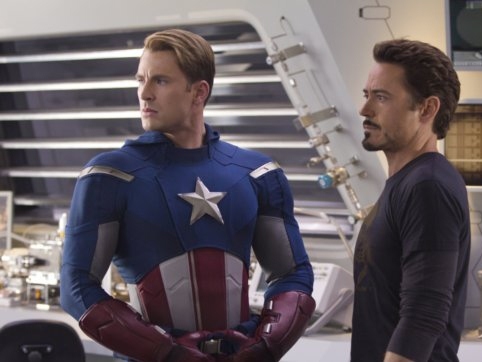
The New York Times’ knee-jerk liberalism doesn’t stop at the paper’s news section.
The Gray Lady’s film reviews are steeped in the progressive mindset, but even by the paper’s standards its latest movie-related dialogue must be read to be believed.
Two New York Times film critics – A.O. Scott and Manohla Dargis – teamed up to talk summer movies recently. During their discussion the two savaged the state of the superhero film movement while blasting the year’s biggest movie, “The Avengers,” in racial terms.
Here’s Dargis lamenting the skin color shades of Earth’s Mighiest Heroes:
The world has moved on — there’s an African-American man in the Oval Office, a woman is the secretary of state — but the movie superhero remains stuck in a pre-feminist, pre-civil rights logic that dictates that a bunch of white dudes, as in “The Avengers,” will save the world for the grateful multiracial, multicultural multitudes. What a bunch of super-nonsense.
It must be exhausting to view the world through a progressive lens. Should “The Avengers” have had a black member? An Asian superhero? A Latino or Latina? Would that have made the movie better, or at least more palatable to Dargis?
Heck, The Hulk is green, isn’t he? And Thor’s a God, not a mortal. Isn’t that diverse enough? “The Avengers” is a mega hit because it’s character driven and action packed all at once, a delectable combination apparently lost on these critics.
Dargis also whines that Scarlett Johansson’s character in “The Avengers,” Black Widow, isn’t given much to do save flaunt her “super rump.” Dargis must have watched a different movie, since I saw a complicated character given a series of stirring set pieces, a heroic fighting spirit and a clever mind able to outwit a god like Loki.
Perhaps both Dargis and Scott missed Samuel L. Jackson’s Nick Fury, a character originally conceived as a Caucasian.
He’s not technically an Avenger, though. He’s just their boss.
Of course, the duo also took the time to slap the Reagan decade during their film chat. Here’s Dargis bemoaning the fallout from the ’80s:
The media consolidation that traces back to the Reagan years has had enormous deleterious consequences on American movies. We’re at a paradoxical moment when new digital technologies have created more and more stuff, movies included, even as the consolidation of the media gives us fewer real choices.
Nonsense. Dargis may be eager to take a lazy jab at Reagan, but she’s clearly not paying attention to today’s film market. Just consider last year’s “Martha Marcy May Marlene” and “Bellflower,” movies made with small budgets but enormous imagination. Yes, the current blockbuster market relies more and more on sequels, reboots and remakes, but the indie film realm continues to deliver challenging fare that refuses to conform to any pre-conceived formula.
And as technology improves, we’re witnessing a new generation of filmmakers who can make beautiful looking films for a fraction of the cost of their studio peers.
Dargis also ignores how many ways people can consume content, from cell phones to desktop viewing. We can download or stream a movie, or go the semi-old fashioned route and pop a high-def disc into our Blu-ray players. People living in small towns without indie film theaters can now watch new films via pay per view from the comfort of their couches.
We have more choices than ever, even if most movie goers choose not to wear the New York Times’ progressive-colored glasses.
Follow Christian Toto on Twitter @TotoMovies

COMMENTS
Please let us know if you're having issues with commenting.